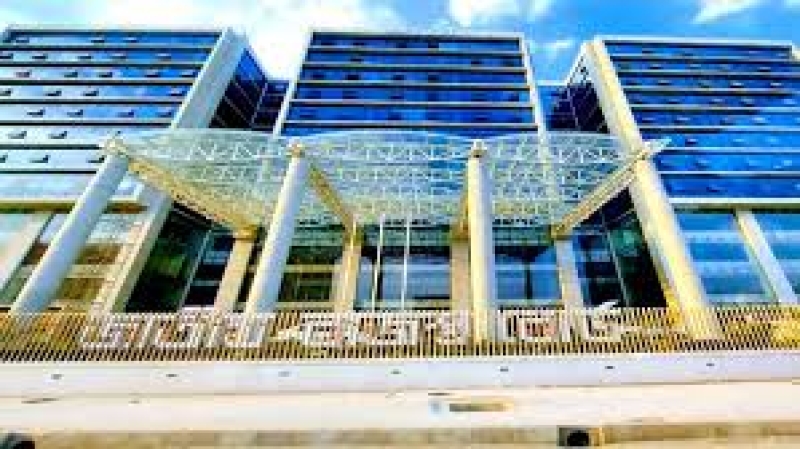- India Sees 9% Drop in Foreign Tourists as Bangladesh Visits Plunge |
- Dhaka Urges Restraint in Pakistan-Afghan War |
- Guterres Urges Action on Safe Migration Pact |
- OpenAI Raises $110B in Amazon-Led Funding |
- Puppet show enchants Children as Boi Mela comes alive on day 2 |
NBR Tightens Rules to Curb Bond Law Abuse

The National Board of Revenue (NBR) has taken steps to tighten the bond law in a bid to curb its misuse, which has been adversely impacting the country’s revenue collection and economy.
“The amendment of the law has been initiated to prevent the misuse of bond facilities in a significant way,” a senior NBR official told UNB, speaking on condition he can't be named.
He noted that the revenue authority is planning to impose stricter penalties, including higher fines and increased jail terms, for violations of bond facility regulations.
“The monetary fines will be increased, and the maximum jail term will be raised from the existing three years to five years,” the official said, adding that other related penalties will also be enhanced.
Under the bonded warehouse system, export-oriented industries are allowed to import duty-free raw materials, particularly fabrics, on the condition that they export the finished products. This system helps reduce lead time and maintain competitive pricing in the export market, especially for the garment sector.
However, misuse of the bonded warehouse facility has led to significant revenue losses for the government, officials said.
A team assigned to amend the bonded warehouse law recently held a meeting to finalise proposed changes.
The official stated that the NBR is introducing reforms to streamline customs procedures for legitimate businesses using these facilities. One such reform is the implementation of the Authorised Economic Operator (AEO) system, which allows AEO-certified businesses to transport goods directly from ports to their factories or warehouses via a green channel, bypassing physical inspections.
This move is expected to significantly reduce clearance time, lower costs, and improve overall trade efficiency.
NBR Chairman Md Abdur Rahman Khan, in a recent pre-budget meeting, also hinted at introducing exemplary punitive measures for those who misuse the bonded warehouse facilities.
“There will be criminal provisions and exemplary punishments to deter misuse,” he said. “There is widespread misuse of bonded warehouse facilities, and we must take stern action to stop it.”
For years, the NBR has been trying to prevent the sale of items imported under bond facilities in the open market.
According to NBR data, 90 percent of woven items, 45 percent of garment accessories, and 35 percent of knit items used in the RMG sector are imported through the bond system. The rest is sourced locally.
Unscrupulous businesses often exploit the system by selling duty-free imported goods in the local market instead of using them in production, thereby evading taxes and duties.
“We aim to curb tax and duty evasion practices,” another senior NBR official told UNB, also requesting anonymity.
Local traders have long urged the NBR to take strict action against those misusing the bonded warehouse privileges. Currently, several preventive teams under Bond Commissionerates are operating nationwide to monitor such activities.
Some license holders use fake addresses or fail to maintain accurate records of their import-export activities to avoid detection. According to rules, goods imported under the bond facility must be stored in designated warehouses, and if not exported, duties and taxes must be paid.
Meanwhile, the NBR has been struggling with delays in automating the bonded warehouse system — a long-anticipated reform meant to enhance efficiency, reduce misuse, and increase revenue.
Despite launching several initiatives and setting deadlines over the years, progress toward full automation remains slow.
In February 2022, then NBR Chairman Abu Hena Md Rahmatul Muneem had announced plans to fully automate the system by 2023.
The reform was part of the National Single Window project, launched in 2017, which aims to integrate 39 government agencies involved in customs processes into a unified digital platform to streamline procedures and reduce paperwork.
Initially targeted for completion in 2019, the project has faced repeated delays. These setbacks have raised concerns among stakeholders regarding the efficiency and timeliness of automation efforts.
Resistance to change from some stakeholders and a lack of coordination among agencies have contributed to the delays, NBR officials admitted.
Exporters have also expressed frustration over delays and alleged harassment while availing bond facilities. In response, the NBR issued directives in November 2021 to expedite bond-related services, setting deadlines for application processing and clarifying required documents. However, the effectiveness of these directives remains debatable.
In August 2024, the Bangladesh Garment Manufacturers and Exporters Association (BGMEA) met with the NBR to address ongoing issues in customs and bond management. The BGMEA emphasised the need for faster, simplified customs services to remain competitive in a challenging global economy.
The NBR assured the BGMEA of its support and reaffirmed its commitment to building a business-friendly environment to boost trade and investment.
As of February 2023, the NBR planned to extend bond privileges to more export-oriented sectors — a move contingent on the completion of automation.
Despite these efforts, the automation process has continued to lag behind expectations. The business community remains vocal in demanding faster and more transparent implementation to improve operational efficiency and competitiveness, reports UNB.
NBR Chairman Abdur Rahman Khan reiterated that his organisation is actively working to implement the automation of the bonded warehouse system.

